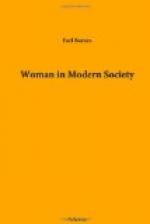Most of these differences which we have been discussing seem to rest in the fact that women are more personal in their interests and judgments than men are. This may be due to their education for thousands of years; but that makes it no less true. Women certainly, in a great majority of cases, are more interested in a case than in a constitution; in a man than in a mission; in a poem that in a treatise; in equity than in law. In a generation when everything is tending toward great aggregations, consolidated industries, segregated wealth, and new syntheses of knowledge, both boys and girls should have such training as will fit them to play their part in these larger units.
As to the feminizing influence of exclusively women teachers on manners and morals and general attitude toward life there can be no real doubt. Boys and girls cannot spend eight or twelve impressionable years of childhood and youth under the constant daily influence of women without having the ladylike attitude toward life strongly emphasized. To deny this is to repudiate the power of constant involuntary suggestion and association. Whether it is desirable or not, is another question. The change may be all in the direction of advancing civilization; but just as in the assimilation of our subject races, the philosophic mind must be distressed by the disappearance of so many varieties of speech, customs, and artistic and industrial products, so in this present assimilation, one cannot help regretting the steady disappearance of the katabolic qualities of the human male. One does not need to say that this feminized product is better or worse than what we have had, but it is certainly narrower, and less in harmony with the world’s thought and work, than it formerly was.




